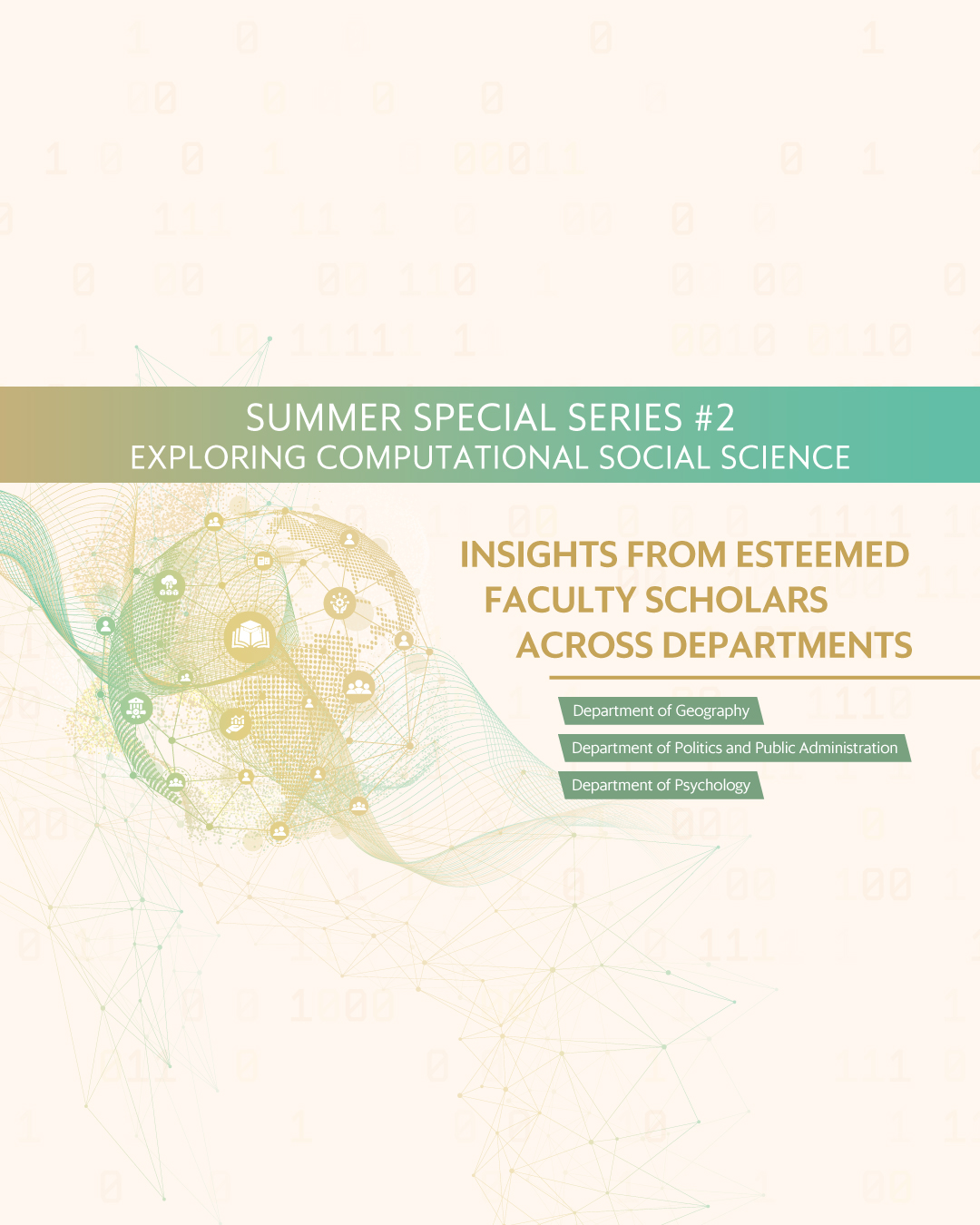Are you curious about the intricate blend of human behaviour and technology? The Faculty of Social Sciences is excited to announce a groundbreaking addition to its flagship Bachelor of Social Sciences (BSocSc) programme – Computational Social Science (CSS).

This innovative major, debuting next semester, is designed for students eager to become future leaders in public service, education, or industry and commerce. CSS stands out as a dynamic interdisciplinary field that empowers students to become social innovators equipped with computational skills to address complex global challenges. It teaches students to develop and refine models of social processes by seamlessly integrating social science insights with technical expertise.
But what exactly is CSS, and how does it differ from Artificial Intelligence (AI)? How does CSS intersect with traditional social science disciplines like Geography, Psychology, Politics and Public Administration, Social Work and Social Administration, Sociology, and Journalism and Media Studies? What practical applications does CSS offer, and how can it shape the future of academia and society at large?
To shed light on these intriguing questions, we have invited esteemed faculty members from various disciplines to share their insights and provide a deeper understanding of CSS. Their perspectives will be featured in a series of chapters in our upcoming editions of the newsletter throughout this summer. This series will offer you a comprehensive exploration and unveil the mysteries surrounding this exciting new field. In this chapter, we will begin by exploring how CSS intersects with traditional social science areas, including Geography, Politics and Public Administration, and Psychology.
Stay tuned to discover how CSS is poised to transform the way we understand and engage with the world. Don’t miss out on this opportunity to delve into the future of social sciences!
Department of Geography
 Bo Huang, Chair Professor of Urban Sustainability
Bo Huang, Chair Professor of Urban Sustainability
My research sits at the intersection of advanced geospatial data science and CSS, with distinct expertise in three core areas: satellite image fusion for generating extensive, high-resolution spatiotemporal datasets; sophisticated spatiotemporal analytics aimed at environmental and health assessment; and multi-objective spatial optimisation methodologies for sustainable urban planning. These research directions are guided by the pressing societal challenges we currently face, particularly issues surrounding carbon neutrality, climate resilience, social inequality, and equitable urban development.
Integrating CSS into my research has significantly broadened my analytical perspective, allowing me to explore urban phenomena through the lens of human behaviour and social dynamics. CSS provides robust frameworks and innovative computational tools that are instrumental in better understanding complex social interactions and their implications for urban sustainability. By embedding these computational methods within geospatial analyses, my work not only captures the physical transformations of urban environments but also interprets the underlying social fabrics that drive spatial patterns and urban dynamics.
Among the emerging trends in CSS, I am particularly excited about the advancement of causal inference methods powered by machine learning, which enable researchers to uncover deeper insights into the mechanisms behind social phenomena. Additionally, the growing integration of agent-based modelling and simulation into urban analytics presents significant potential, allowing for detailed exploration of policy scenarios and their outcomes in complex, adaptive urban systems. These techniques facilitate a shift from purely descriptive studies towards prescriptive analytics capable of predicting and guiding urban growth trajectories.
The proliferation of large-scale urban datasets, combined with increasingly sophisticated computational methods, is reshaping academia by fostering interdisciplinary collaborations that bridge social science, data science, and urban planning. This interdisciplinary approach enriches the analytical rigour and relevance of research outputs, equipping scholars to derive actionable insights that directly inform policy-making. Furthermore, these computational advancements empower policymakers with evidence-based tools that can accurately assess the social equity impacts of urban interventions, thus leading to more inclusive and sustainable policy decisions.
 Yuyu Zhou, Professor
Yuyu Zhou, Professor
My research aims to improve our understanding of urban environmental change and its implications for human activities (e.g., building energy use and greenhouse gas emissions) and welfare (e.g., health disparities and climate vulnerability) using geospatial technologies such as remote sensing, GIS, and geospatial modelling. CSS is integral to this work, as it bridges geospatial data with social dynamics. For instance, by merging satellite-derived urban heat maps with anonymised mobility data or social media traces, we can model how extreme heat disproportionately affects low-income communities’ daily routines. Similarly, agent-based models informed by remote sensing help simulate how policies like urban greening might alter both ecosystems and socioeconomic outcomes, such as equitable access to cooling shelters.
Emerging CSS tools like AI-driven information extraction for satellite remote sensing imagery are particularly exciting. AI techniques applied to satellite imagery now enable estimates of socioeconomic conditions, such as predicting neighbourhood-level air quality or energy poverty, using minimal ground data. For example, AI-driven enhancement of satellite data can sharpen insights into informal settlements or urban microclimates, revealing patterns invisible to traditional methods. These enhanced datasets, when integrated with geospatial models and social surveys, allow cities to simulate policy impacts with unprecedented granularity, such as identifying flood-prone areas where vulnerable populations reside or optimising green infrastructure placement to maximise health benefits. Such tools empower precision policymaking, helping target interventions like pollution mitigation in environmental justice communities or retrofitting energy-inefficient buildings in marginalised neighbourhoods. For academia, they foster interdisciplinary collaboration, for example, between ecologists and data scientists. Societally, they can advance participatory governance by enabling residents to report localised risks, fostering co-designed solutions. By merging geospatial rigour with social complexity, CSS can help cities navigate climate adaptation and equity—an urgent need in our urbanising world.
Department of Politics and Public Administration
 Haohan Chen, Assistant Professor
Haohan Chen, Assistant Professor
My research lies at the intersection of political communication and computational methods. I develop computational tools to collect and analyse a variety of media data to understand the dynamics of political expression in various political contexts from a comparative perspective. For example, in a collaborative study published in the Proceedings of the National Academy of Sciences, I conducted a field experiment showing that exposure to opposing views on social media can increase political polarisation. In other research, I have applied computational tools to understand public opinion on COVID-19, the missions and activities of nonprofit organisations, and the dynamics of civil conflict and infectious disease. For me, as a researcher, CSS provides the most powerful tools. As a teacher at HKU, I teach “Data Science in Politics and Public Administration” and “Global Information Wars”. Both courses aim to train a new generation of social scientists capable of mastering the application of computational tools for public service and understanding their potential and limitations in a changing world.
One of the most exciting developments in CSS today is Generative Artificial Intelligence (GenAI). GenAI tools like ChatGPT and DeepSeek can be very helpful assistants for researchers and practitioners in public service. They can quickly collect and summarise information, analyse data, and even assist with writing. I believe these tools will soon become basic skills for anyone working in public policy, government, or nonprofit organisations. The development of these tools also comes with risks. AI models can produce biased or incorrect answers, and they can be used in harmful ways, such as spreading misleading information or providing politically biased content. Society is now searching for ways to maximise the benefits and minimise the risks of AI. A new generation of computational social scientists is central to this effort. Academic training in both social science theories and computational tools will enable them to accurately evaluate the implications of new technologies for policy and society, and to propose regulatory tools for governments and businesses to unleash GenAI’s full potential for social good.
 Fangda Ding, Assistant Professor
Fangda Ding, Assistant Professor
I use causal inference methods to investigate social inequities across three critical domains: diversity and equity in public sector employment, inequities in climate-change policy responses, and the digital divide. By applying rigorous causal frameworks, I can isolate the precise mechanisms through which institutional structures perpetuate or mitigate inequities. This approach enables me to distinguish between superficial associations and genuine causal relationships that drive systemic disparities. For example, my research on experimental design to uncover how seemingly neutral hiring criteria in government agencies can inadvertently disadvantage applicants from historically marginalised communities, and how climate policies often disproportionately affect communities with various climate vulnerabilities. By establishing causal pathways, my findings provide actionable insights for policymakers seeking to implement evidence-based reforms that address the root causes of inequity.
The integration of CSS techniques has dramatically transformed my analytical capabilities in researching administrative equity issues. Traditional quantitative methods, while valuable, often fail to capture the nuanced ways inequity manifests across complex bureaucratic systems. My research leverages advanced machine learning algorithms to analyse vast repositories of unstructured administrative data that reveal subtle patterns of differential treatment. For instance, natural language processing algorithms help me identify gender bias in the treatment of public sector employment. Meanwhile, large language models have revolutionised my analysis of policy documents, which enables a comprehensive examination of how inequities evolve across decades of administrative practice. These computational approaches allow me to construct sophisticated predictive models that simulate how proposed policy interventions might affect different population segments across various scenarios. By combining these forward-looking simulations with historical causal analysis, my research provides public administrators with both diagnostic insights into current inequities and prospective guidance on which interventions are most likely to create more equitable outcomes across demographic and geographic boundaries.
Department of Psychology

Frances Jingwen Jin, Assistant Professor
I am a clinical psychologist and researcher, and my lab integrates affective science, neuroscience, and clinical psychology to investigate how emotion-related perception and belief are formed and how they shape mental health conditions such as anxiety and depression. My research employs computational modelling, neuroimaging, and behavioural experiments to study the corresponding mechanisms. For these aims, my lab uses a variety of computational tools. For example, we apply active inference modelling—a Bayesian approach—to quantify how individuals with anxiety disorders process environmental uncertainty and drift-diffusion modelling to identify maladaptive decision-making patterns. Recently, we have also been using network analysis of large-scale psychopathology data to examine how various symptoms group and develop. These approaches allow us to model interactions between cognitive biases, social environments, and clinical outcomes on an unprecedented scale.
Multiple emerging CSS trends hold transformative potential for both research and societal impact. As a researcher primarily interested in understanding what makes human beings experience certain emotions and how some individuals develop pathological cognition, emotion, and behaviour, I aim to use cutting-edge computational tools to better investigate the underlying mechanisms. For instance, causal network analysis, when combined with large datasets, can help disentangle social determinants of mental health, such as how community support systems buffer against depression risk, guiding targeted intervention strategies. Additionally, by combining Bayesian modelling with carefully designed behavioural tasks, we can investigate how biased social beliefs form and update. In the near future, we hope to further apply existing and emerging computational tools to enable real-world translation of laboratory findings and construct culturally validated emotional and clinical models for understanding emotions and their related psychopathology. By combining rigorous computational tools with clinical expertise, we aim to advance both academic understanding and practical solutions that address pressing mental health challenges in our society.
 Andrew Luo, Assistant Professor
Andrew Luo, Assistant Professor
I am an assistant professor jointly in the Department of Psychology and the Institute of Data Science. My research primarily focuses on computational cognitive science and computational neuroscience, especially on understanding how humans process and understand the visual world around us.
Over the last decade or so, an incredibly exciting trend is the appearance of large-scale cognitive and neuroscience datasets which enable data-driven approaches that leverage foundation models to understand subtle trends in human cognitive processing. Beyond helping us better understand the brain, we’ve also increasingly found that as AI gets better and better, they perform more similarly to humans, and converge upon the representations used in the brain.
As the amount of data collected increases, and as AI becomes more sophisticated — an increase in the use of computational methods to help us understand and respond to trends in the data is inevitable.
#1 Exploring the Human Stories Behind Big Data: New Computational Social Science Major Bridges Social Sciences and Data Analysis
#3 Unveiling New Dimensions with Computational Social Science
